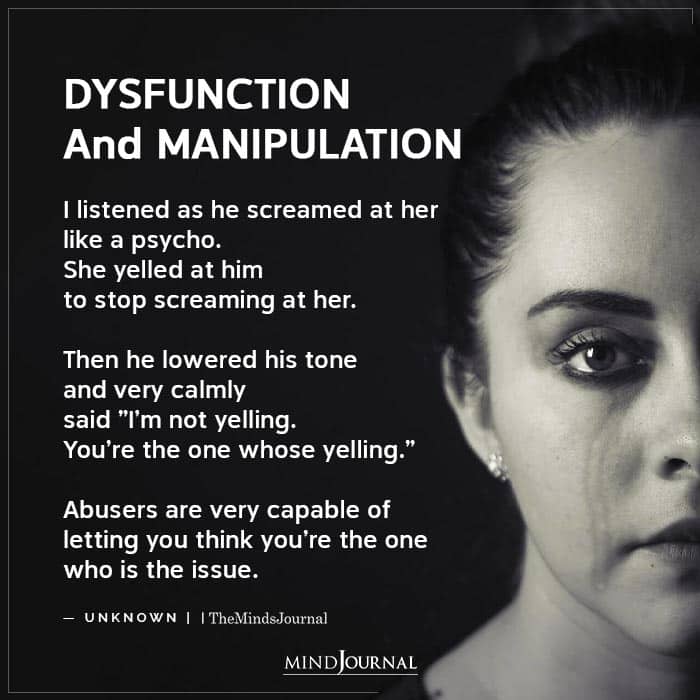Relationships of all types are based on mutual respect, compromise, and sacrifice. It takes both parties to establish common ground with joint expectations of give-and-take. When there is an imbalance between partners, the relationship can become a breeding ground for resentment and abuse.
Narcissists and those with similar traits thrive in negative environments. A relationship hallmarked by abuse and tears ensures that the narcissist is in firm control. Narcissism wears down the victim while strengthening the abuser, creating and nurturing an imbalance of power. This imbalance is necessary for a narcissistic individual to have a relationship in the first place.
Manipulating Love Into A Weapon
At their core, narcissists are charming users and manipulators. They can turn a confident, productive, calm individual into someone who’s doubtful, high-strung, and codependent. If someone is perceived as better or stronger than the narcissist, that person becomes a target for takedown.
A narcissist can simultaneously be jealous of the stronger person and yet believe they themselves are, or should be, the focus of jealousy. If someone is perceived as “better” or “richer,” the narcissist will do their best to tear down that difference, take advantage, and maintain control.
Related: Manipulation Of The Charming Narcissist
Even the most settled and confident individuals can turn into different people in a narcissistic relationship. A relationship doesn’t have to be romantic to be abusive; trauma and pain cross over lines of all partnerships.
As with other forms of abuse, the pain inflicted by a narcissist is private and personal. Many victims are afraid to speak up or seek help. The following anecdotes are from narcissistic survivors who have shared their experiences to show that abuse doesn’t happen in a vacuum.
While some of these situations may appear normal for a relationship, remember that there is no give-and-take in a narcissistic connection. In a healthy relationship, there are clear and respected boundaries, positive reinforcement, and equal support. These stories reflect the result of being with a narcissistic individual and being worn down by the abuse and manipulation.

Real-Life Stories Of Narcissistic Abuse
“Gave him the password to my iCloud and home security because he said he was ‘worried about us’.”
“I granted access to my camera system and deadbolt passcode.”
“Co-signed for an auto loan.”
“Took on a huge bank loan, which he defaulted on and left me paying for…on my own.”
“My roommate moved out and left me hanging out to dry on the rent.”
“Paid off the credit card debt.”
“Gave him my money for anything he asked for.”
“He didn’t have a car, so I gave him mine…and gas money when I needed him to drive me places.”
“I was in a long-distance relationship right out of college. He lived with his mom at the time. He invited me to come to meet his mom and stay with them, but I stated that I felt more comfortable staying at a hotel. The day I arrived was the same day the power company came knocking to turn off the power. I was about to leave and pay for a hotel for the week when he convinced me it was just as much money to pay to keep on the lights. Plus, it was his MOM and I did want to make a good impression, right? I paid a fee for at-the-door service and the bill. I slept on the couch which was super uncomfortable. His mom wasn’t destitute. She liked to drink, smoke, and gamble. I often wonder if they scheduled the “at the door service” to put me on the spot. They were both very manipulative and I was eager to be accepted.”
Related: 15 Phrases A Narcissist Uses To Compel You To Stay With Them
“Drove them back and forth 2.5 hours each way to sports practice because they were ‘tired from working all day’ and I wasn’t supportive if I didn’t help. Never mind that I also had a demanding 9-5 job.”
“We were living a half-hour apart, and he would just expect me to be there whenever he demanded. I could not take time to settle my own business, like if I was in the middle of laundry or a task; just jump in the car and go. One time I took too long (according to him) and he screamed at me for hours.”
“My partner’s ex destroyed over $500 worth of my things, simply because she felt she was entitled to do so. We are now in small claims court because she was clearly legally wrong, but she is refusing to take any responsibility.”
“My ex-wife violated the court restraining order, was caught on a security camera doing so, and was arrested for trespassing…she blamed me and told our kids I was at fault.”
“Taking him back over and over, thinking the breaks were part of his ‘process’ rather than seeing that our connection was a joke to him. Believing the best in him when he continued to prove me wrong.”
“Watching myself act crazy because he knew exactly how to say things that would upset me and then he would turn around and call ME unhinged.”
“Attacked me verbally for setting strict boundaries.”
“Bailed him out of jail.”
“I was with a guy that was in the middle of a custody situation. I helped him with (read: did all of) the legal footwork and filing papers. He ended up dropping everything and went back to his ex.”
“I researched, filled out, completed, and provided my ex’s family with their immigration documentation…only for them to be racist and abusive to me.”
“I lied under oath for a deposition during his divorce and custody/alimony battle.”
“I covered for him when questioned about his alcohol consumption and habits.”
“My first husband only wanted two kids…he convinced me that was the perfect size family. When my second was born, I had my tubes tied. Now that I am remarried, I can’t have any more children with my new husband.”
“I married them.”
“She convinced me that she was just friends with the guy she was cheating with and that I was imagining things. She finally admitted to it when she finished her degree program and got a better job…and she was financially able to leave me.”
Related: 11 Traps of Narcissistic Entanglement
Turning The Tables
Narcissists are skilled at rationalizing every situation mentioned above – and more. Not only can they turn an outrageous situation normal, but they can convince sane, levelheaded individuals that they are dramatic, irrational, and crazy. Gaslighting and micromanipulations are just a couple of the tools that narcissists use for confusing the victim in a relationship and keeping them under control.
No matter the type of relationship, narcissistic abuse is real but can be overcome. The lack of empathy or sympathizing is a hallmark of a narcissistic partner and can cause major emotional damage. Finding a qualified counselor or life coach is the key to starting over and reclaiming your self-respect.
Kristy Lee Hochenberger can be contacted for life coaching at ExcelsiorLifeCoaching@gmail.com and facebook.com/excelsiorcoaching
Written By Kristy Lee Hochenberger Originally Appeared On Psychology Today











Leave a Reply